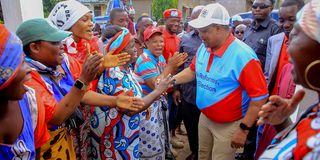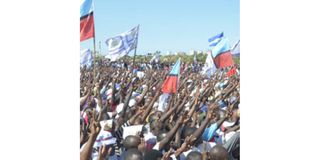Prime
Polls boycott: Chadema's high-stakes gamble prompts debate over its long-term relevance

What you need to know:
- What is clear is that the party’s decision has reshaped Tanzania’s political landscape—and the conversation around democratic reform is far from over
Dar es Salaam. Chadema’s decision to throw down the gauntlet in a high-stakes political gamble, by boycotting elections, has shifted Tanzania’s political discourse into uncharted waters, prompting debates over the party’s long-term relevance—and even its future.
The Independent National Electoral Commission (INEC) announced over the weekend that Chadema would be barred from contesting any election for the next five years after refusing to sign the electoral code of conduct—a requirement for participation in the 2025 polls.
Eighteen registered political parties signed the electoral code of conduct on Saturday, April 12, 2025, in the absence of Chadema, which had earlier declared that it would not take part in the 2025 General Election unless meaningful and comprehensive electoral reforms were undertaken.
"Any party that has not signed the code will not participate in this year’s General Election or subsequent by-elections for five years," INEC director Ramadhani Kailima said.
The decision has divided opinions.

While some observers say this could spell the end of Chadema’s influence on national affairs, others argue that it is a bold strategic move to press for electoral reforms.
The Civic United Front (CUF) offers a cautionary tale. CUF Secretary-General Husna Abdalla said their 2015 General Election boycott in Zanzibar led to demoralisation among members, loss of funding tied to electoral performance, and declining political relevance.
“We lost our parliamentary voice, state subsidies, and visibility. Chadema risks facing a similar fate if members lose hope,” she warned.
A sacrifice for long-term reform?
Other stakeholders believe Chadema is prioritising long-term democratic reforms over short-term electoral gains.
“They are sacrificing participation to demand constitutional and electoral reforms. It may cost them now, but it could benefit the nation in the future,” said Sheikh Issa Ponda, Secretary-General of the Shura Council of Imams.
INEC under scrutiny
University of Dar es Salaam political analyst, Dr Sabatho Nyamsenda, questioned INEC’s impartiality in enforcing the code of conduct.
“If the electoral body enforces rules that sideline stakeholders, it ceases to be neutral. Chadema’s stance echoes frustrations felt by many,” he said.
He also cited research indicating that the ruling party CCM enjoys undue access to state resources, supporting opposition concerns.
Calls for dialogue
Calls for national dialogue have intensified. Archbishop Nelson Kisare of the Mennonite Church urged restraint and justice over confrontation.
“We must not waste national resources on suppression. Peace is born from justice,” he said.
Tanzania Episcopal Conference (TEC) Secretary-General, Dr Charles Kitima, added: “Let us reflect on the type of elections we’ve had since 1995. Constructive dialogue is our best path forward.”
Chadema’s internal split?
Meanwhile, ACT Wazalendo appears ready to absorb potential defectors from Chadema.
The party’s Deputy Chairperson, Mr Issihaka Mchinjita, said they were open to welcoming new members while maintaining internal democracy.
“Change comes through participation. Our structures are inclusive and transparent. All members—new and old—will go through fair primaries,” he said.
However a senior member of the party’s internal 'G55' group that was opposed to the decision not to participate in elections, Daniel Ngogo, said they have now closed ranks behind the party’s leadership.
He said they had advised the leadership to consider contesting the elections.
However, they have since aligned with the party’s official position—'No Reforms, No Election.'
"Our input was heard, but the position stands. We are not leaving the party. We believe in Chadema’s agenda and will continue to uphold the official stance unless it's revised,” he said.
Legal uncertainty
The legality of INEC’s position has also been challenged. Article 162(1)(a) of the electoral law empowers the Commission to publish and enforce a code of conduct, which must be signed by political parties and candidates.
Clause 1.5(a) of the code says any party that fails to sign the document is barred from participating in campaigns.
However, it does not clearly state whether such a party is prohibited from contesting elections altogether.
Legal experts argue that this ambiguity could be a constitutional issue.
“There is no provision in the law that revokes a party’s right to contest elections for refusing to sign the code,” said Tanganyika Law Society President, Boniface Mwabukusi.
Lawyer Edson Kilatu added: “Participation in elections is a constitutional right. Denying this over an unsigned document is legally questionable.”
What’s next for Chadema?
As political pressure mounts, Chadema faces tough choices.
Will the boycott galvanise public support for reform or lead to a decline in the party’s relevance?
Will the legal challenge be mounted?
And will INEC’s interpretation of the code withstand scrutiny?
What is clear is that the party’s decision has reshaped Tanzania’s political landscape—and the conversation around democratic reform is far from over.






